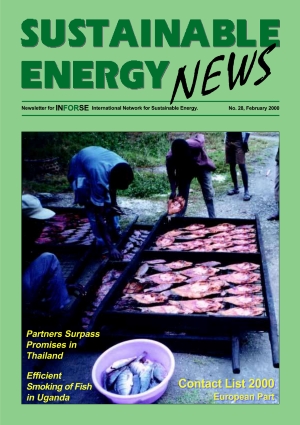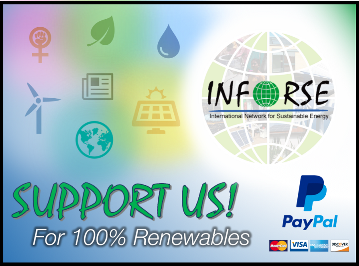|
|
|
|
|
|
|
|
|
|
|
|
|
|
|
|
|
|
|
|
|
| Follow Us: |
| We Welcome Records, but More are Needed | |

| |
|
By Gunnar Boye Olesen INFORSE-Europe Coordinator |
|
|
The year 2000 begins with new records for renewable energy. Never before has so much electricity been produced from wind turbines or from solar cells. Solar heating, biogas, solar cooking, and other renewable-energy technologies have also reached new heights. Parallel to this, successful energy-efficiency technologies are spreading rapidly: efficient light bulbs, efficient fridges, low-energy houses, fuel-efficient cook stoves, etc. The new technologies also become ever more visible on “macro-level”, such as in national energy statistics. These successes are not enough to ensure a sustainable development, however. CO2 emissions are increasing, as is the amount of nuclear waste waiting for long-term storage. No industrialised country has realised a sustainable energy path in which its CO2 emissions and other effects of energy use actually decrease fast enough towards sustainable levels. Maybe most needed for a sustainable energy path is energy conservation. For decades, studies and examples have shown that energy-efficiency could reduce energy consumption by a factor of two or more without decrease of comfort or of production. In spite of this, during the last decade, only countries experiencing major economic crisis have reduced energy consumption substantially. The most progressive of the industrialised countries have maintained a steady energy consumption, regardless of economic growth. In these countries, increased efficiency has kept pace with the economic growth, leading to a decoupling of growth and energy consumption. The decoupling is not, however, inherent in economic development: only when a broad range of supporting measures has been applied, from energy taxes to standards to awareness-raising, the increase of efficiency has kept pace with moderate economic growth. If more of the energy-efficiency potential were realised, energy consumption in industrialised countries could go down, not just be stabilised as in the current “best practice” countries. Combining that with utilisation of a substantial share of the local renewable-energy potential, the industrialised countries could reduce the environmental effects of their energy systems to sustainable levels. Why is this not happening? We raised this question 8 years ago when the INFORSE network was formed. In spite of the successes with renewable energy and energy-efficiency during these 8 years, we have to raise it again. Now, sustainable energy is on the “global agenda”, in the Commission for Sustainable Development, via UN conventions, and at the Earth Day 2000 events. These are unique chances to raise questions regarding the unused potentials for energy-efficiency and renewable energy, to raise the question of why proven, cost-effective policies and measures for sustainable energy are not used, on the national level, on regional levels, and on the international level in UN institutions and in multilateral development banks. At the start of the new millennium, there is an urgent need for more and stronger NGOs that can raise these questions and that can propose solutions on all levels, from the international summits all the way through the intermediate levels to local communities all over the world. |
|

| |
| Published in Sustainable Energy News |
|
|
Go back to main page of ISSUE #28 (981KB) 20 pages (2000-02-28) |
|
| Contact | |
| |
INFORSE Secretariat Klosterport 4F, 1. floor DK-8000 Aarhus C Denmark Phone: +45 86 22 70 00 Twitter: INFORSE_org Facebook: INFORSE Web: inforse.org E-mail: ove@inforse.org |
